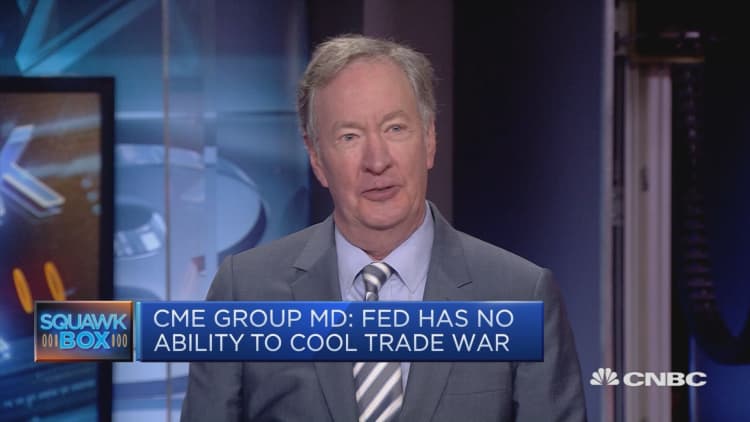President Donald Trump would be better off not cutting a trade deal with China as it could backfire on him ahead of the 2020 U.S. election, according to the managing director and chief economist at the CME Group.
"The political issue is very serious here," Bluford Putnam told CNBC Wednesday.
"President Trump faces a Democratic opposition that really doesn't like China, but he also faces — on part of his Republican Party — people that want him to be much tougher on China. So, he's way better off never cutting a (trade) deal. If he cuts a deal, he'll be criticized from both sides," he told CNBC's "Squawk Box Europe."
"If he just stays tough, he rides through it just fine. Which is, by the way, the same issues (Chinese President) Xi Jinping has: He can't give in to a bully like President Trump, so what's he going to do? He doesn't want a deal either," he added.
Putnam believes there won't be any decision on a deal before next year's U.S. election. Having espoused an "America First" policy to voters ahead of the 2016 election, Trump will be aware that the opposition Democratic Party, and voters, will be quick to criticize his approach to global trade and China if the U.S. economy suffers as a result.
Since early 2018, the U.S. and China have engaged in a trade dispute with both countries imposing tariffs on billions of dollars' worth of one another's imports. Trump initiated the tariffs citing unfair trade practices from China and accused it of intellectual property theft.

Talks to resume the trade dispute have so far yielded little in the way of a solution. In fact, the situation deteriorated in recent weeks with new U.S. tariffs on $112 billion of Chinese consumer goods, and more due later this year. China responded with retaliatory tariffs on U.S. goods worth $75 billion.
The new tariffs could cost the average American household $1,000 a year, according to a J.P. Morgan estimate and are seen to have hit both U.S. and global growth. In July, the International Monetary Fund forecast U.S. growth to be 2.6% in 2019 and moderating to 1.9% in 2020.
The fund downgraded its forecast for global growth to 3.2% in 2019, down from its April forecast of 3.3%, citing "trade and technology tensions that dent sentiment and slow investment" as one of the reasons. It forecast global growth of 3.5% in 2020.
CME Group's Putnam said U.S. citizens did not pay too much attention to economic metrics if their lives were going smoothly enough.
"In the American public, and I think in general, it's about the narrative that consumers are willing to tell. It's the stories they internalize — and they don't internalize the numbers like we do in finance. As long as people have their jobs and they're not worried about their neighbors losing their jobs, the confidence level will be high enough that the average voter … is going to be fine with the general slugging along with the economy," he said.
Putnam believes the 2020 election would instead be fought on "diplomacy, on the trade war and immigration and health care issues."


